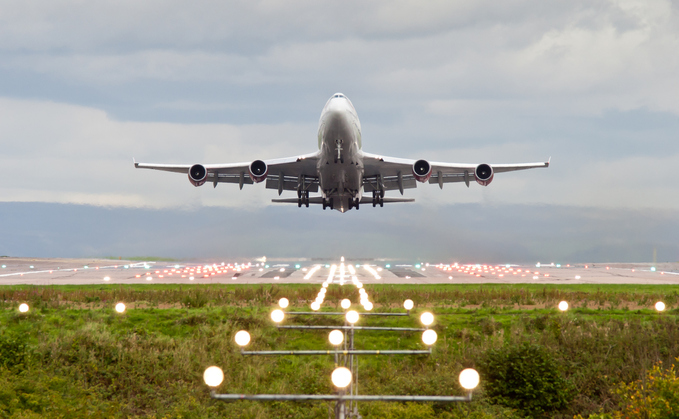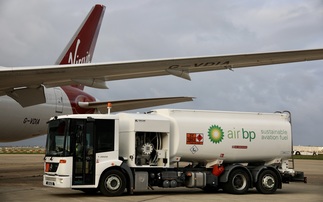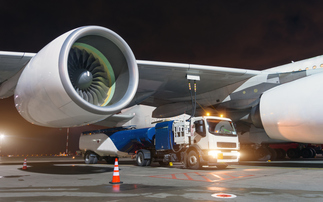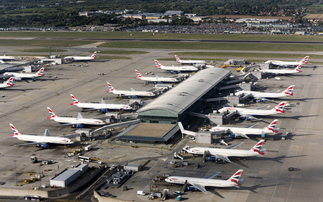A plane takes off at Manchester Airport | Credit: iStock
Emissions from UK flights rose 23 per cent last year, putting at risk government goals to cap pollution at 2019 levels
UK aviation emissions rose sharply last year, and are now at 89 per cent of the level recorded before the coronavirus pandemic hit in 2020.
That is the headline finding from a new report by the think tank Transport & Environment (T&E), which revealed the number of flights from UK airports rose 16 per cent last year to nearly 940,000 flights, while carbon emissions rose 23 per cent year-on-year to 32 million tonnes.
The surge in demand for aviation means the UK is fast-approaching pre-pandemic levels of flying, with 2023 experiencing 88 per cent of the number of flights in 2019, and 89 per cent of the CO2 emissions.
The trend deals a blow to hopes the pandemic could trigger a permanent switch to business practices and behaviours that lead to reduced demand for flights. It also presents a challenge to the government's Jet Zero Strategy, which committed to never crossing 2019 pollution levels again as part of efforts to develop a net zero emission aviation industry by 2050.
The new analysis confirms emissions from UK flights have increased across all categories, with domestic flight emissions up 16 per cent last year, European flight emissions 13 per cent higher, and long haul flight emissions having risen by 28 per cent.
T&E warned the data suggests aviation emissions could reach an all-time high in 2024.
The analysis also highlights the role of budget airlines in driving up emissions. "While British Airways remains the highest polluter overall producing 7.52 Mt CO2 in 2023, their emissions are still below 2019 levels," T&E said. "On the other hand Ryanair, easyJet, and Jet2.com emitted 13.5 per cent, 4.8 per cent, and 26.3 per cent more than their 2019 emissions, respectively. This suggests that budget airlines are the driving force behind emissions bouncing back."
The government has repeatedly resisted calls to introduce policies that could curb demand for aviation, instead favouring support for new technologies and fuels that it hopes will allow the sector to decarbonise in the coming decades.
Various loopholes in the UK emissions trading scheme means the price of carbon varies significantly for airlines, while aviation is not subjected to VAT or fuel duty.
"UK aviation is addicted to pollution," said Matt Finch, UK policy manager at T&E. "Some airlines had their most polluting year ever in 2023, and there is a good chance that many more will get that badge of dishonor in 2024. The UK Government is apparently committed to charging polluters to help pay the clean-up costs they cause, but it is willfully ignoring charging airlines, despite their growing climate impact. That's the directly opposite approach they're taking to the nation's drivers, who must pay fuel duty every single time they fill up at the petrol pump."
The analysis formed part of Transport & Environment's annual assessment of Europe-wide aviation emissions, which found the same trends repeated across the continent.
"The low cost business model is driving unsustainable growth in the sector," said Jo Dardenne, aviation director at T&E. "We were lured into thinking that airlines would build back better after Covid, but with this exorbitant increase of pollution by budget airlines, 'green' aviation will never see the light of day. Clean technologies, like sustainable aviation fuels, won't be able to keep up with the growth of Ryanair, Wizz Air, and others."
Budget airlines maintain they tend to be more fuel efficient than legacy carriers, while the sector as a whole insists it is investing heavily in boosting production capacity for sustainable fuels and developing new low and zero emission aircraft.
But Dardenne argued policies to curb demand for flying would be needed if governments are to meet their emissions goals, noting that more than three quarters of European flights are not covered by a carbon price.
"Flying is far too cheap," she said. "Whether we are talking of legacy carriers or budget airlines, the aviation sector is not paying enough for its carbon emissions. Over 10 years after the carbon market was introduced for aviation, the system still falls short when it comes to incentivising a shift away from fossil flying. This absurd situation where a passenger pays more for their coffee at the airport than some airlines pay for their emissions must come to an end."
Keep up to date with all the latest green business news by signing up to the free Daily and Weekly BusinessGreen Newsletters.










